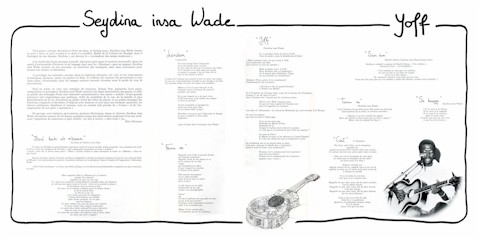
Like Comb and Razor, I seem to be experiencing some difficulty managing to get a post up, not, as in Uchenna's case, because I'm terribly busy with anything else, but because of a general sense of ennui. Spring fever perhaps?
Anyway, I've got a few things in the works, but I just realized that it's been more than two weeks since I've posted, so here's something in the nature of a stop-gap.
In one of my first dispatches, I posted five tracks from Remmy Ongala's two 1988 albums On Stage With Remmy Ongala (Ahadi AHDLP 6007) and Nalilia Mwana (Womad WOMAD 010). Which leaves seven tunes that I didn't post, so here they are!
"Tembea Ujionee," from Nalilia Mwana, means "Travel and See For Yourself." Remmy sings, "Travel and see for yourself. Don't wait to be told about it. There are many things to see in the world. Waiting for you. . ." By the way, although the liner notes of the LP credit this song to "Remmy Ongala & Orchestra Super Matimila," I suspect it, along with other songs on Nalilia Mwana, was recorded when Ongala was with Orchestra Makassy. That sounds an awful lot like Mose Fan Fan Se Sengo on lead guitar!
Remmy Ongala & Orchestra Super Matimila - Tembea Ujionee
In "Mnyonge Hana Haki" ("The Poor Have No Rights") Remmy deplores the plight of the unfortunate. "I have nothing to say. . . Remmy is a poor man, an ugly man. Remmy has nothing to say to his companions. A bicycle has nothing to say in front of a motorbike. A motorbike has nothing to say in front of a car. A car has nothing to say in front of a train. The poor have nothing to say in front of the rich. . . The poor have no rights."
Remmy Ongala & Orchestra Super Matimila - Mnyonge Hana Haki
The liner notes of Nalilia Mwana state that "Arusi ya Mwanza" is ". . . about a young woman who is married in Mwanza and goes to live with her husband in Dar es Salaam. After a few days he deserts her and she is too ashamed to return home to face the questions of her parents and neighbors. She warns other women that men are deceitful and will promise a house and car to make girls give up their studies. She herself only wanted to be happy and start a family like her friends. . ."
Remmy Ongala & Orchestra Super Matimila - Arusi ya Mwanza
On Stage With Remmy Ongala unfortunately doesn't provide song translations.
Remmy Ongala & Orchestra Super Matilmila - Sauti ya Mnyonge
Remmy Ongala & Orchestra Super Matimila - Asili ya Muziki
Remmy Ongala & Orchestra Super Matimila - Maisha
Remmy Ongala & Orchestra Super Matimila - Mama Mzazi
If you would like to recreate the original LPs using the other five tunes, the tracklistings are as follows:
The picture at the top of this post is from this site.
Nalilia Mwana (Womad WOMAD 010, 1988)
1. Nalilia Mwana
2. Sika ya Kufa
3. Tembea Ujionee
4. Ndumila Kuwili
5. Mnyonge Hana Haki
6. Arusi ya Mwanza
On Stage With Remmy Ongala (Ahadi AHDLP 6007, 1988)
1. Sauti ya Mnyonge
2. Asili ya Muziki
3. Maisha
4. Kifo
5. Mama Mzazi
6. Narudi Nyumbani



















